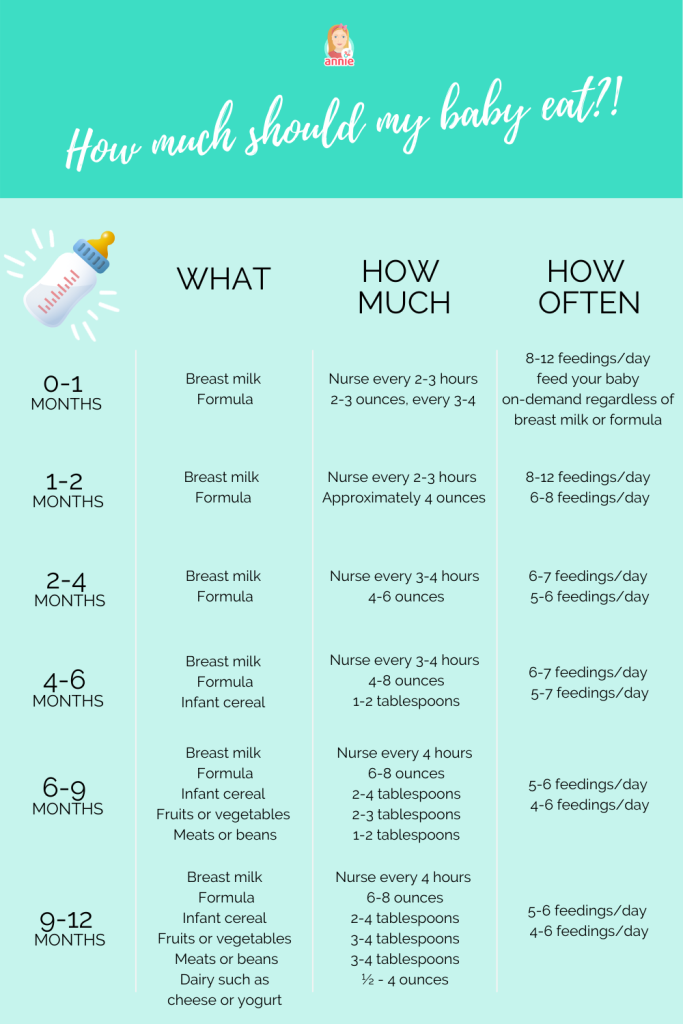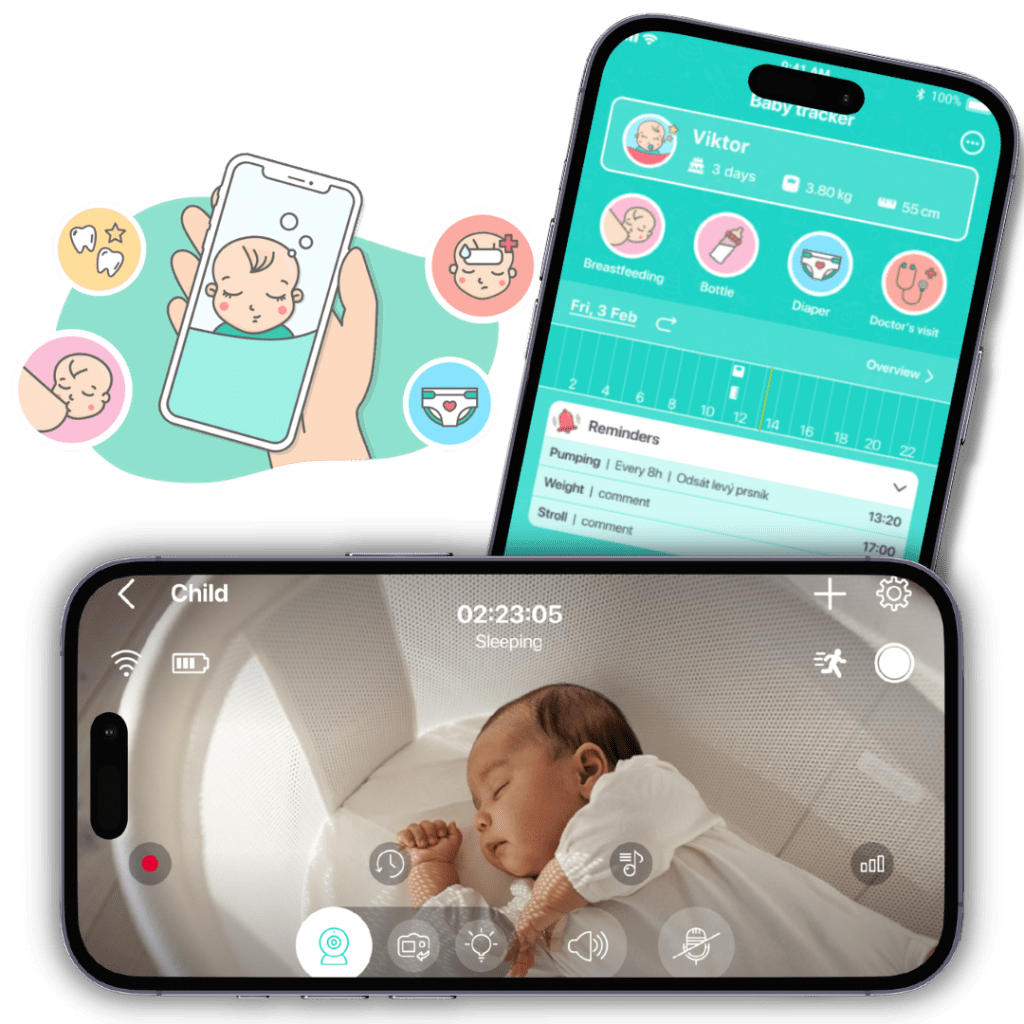
Baby Feeding Schedule: How Often and How Much Should Your Baby Eat?
- Created:
6. 5. 2021 - Updated:
11. 6. 2024
Whether you’re a first-time parent or a seasoned caregiver, figuring out why your baby is crying can feel like a guessing game. Fortunately, paying attention to your baby’s daily feeding schedule can help reduce some of the guessing.
By following a feeding schedule, you might be able to avoid some of the fussiness associated with hunger, and you’ll be able to more easily tell whether the baby is pooped or tired instead.
Newborns
Feed you baby only with breast milk or formula.
Breast Milk
Most newborns eat every two to three hours, according to the American Academy of Pediatrics (AAP), and they drink 1-2 ounces of breast milk per feeding. By the time your baby reaches two weeks old, this amount will increase to 2-3 ounces. Generally, you can tell your little one is eating enough if they wet their diaper every three to four hours.
Formula
A formula-fed baby will take about 2 to 3 ounces per feeding, and they’ll eat every three to four hours. This amount will increase as your baby grows. You should aim to feed your baby 2.5 ounces of formula per pound of baby body weight daily.
RELATED: Baby Hiccup – How to prevent and how to handle baby hiccup.
Wake or not wake the baby for feeding? During the first few weeks, if baby does not wake themselves up in the middle of the night to eat, your pediatrician may recommend waking them for feedings.
| AGE | WHAT | HOW MUCH | HOW OFTEN |
| 0-1 MONTHS | Breast milk Formula | Nurse every 2-3 hours 2-3 ounces, every 3-4 hours | 8-12 feedings/day Continue to feed your baby on-demand regardless of breast milk or formula |
1-4 Months Old
Between 1 and 4 months of age, your baby’s appetite will increase and they’ll become more vocal about telling you when they’re hungr. Two-month-old baby will usually eat 4 to 5 ounces every three to four hours.
| AGE | WHAT | HOW MUCH | HOW OFTEN |
| 1-2 MONTHS | Breast milk Formula | Nurse every 2-3 hours Approximately 4 ounces | 8-12 feedings/day 6-8 feedings/day |
| 2-4 MONTHS | Breast milk Formula | Nurse every 3-4 hours 4-6 ounces | 6-7 feedings/day 5-6 feedings/day |

4-6 Months Old
Most babies are ready to start solids around 5 or 6 months of age.
TIP N.1: Indicators that the baby is ready for solids: mastering the grabbing skill, developing head and neck control, and losing the tongue-thrust mechanism that automatically pushes food out of their mouth. Never start solids before 4 months.
Feed your little one about 1-2 tablespoons of food twice a day. Solid food shouldn’t take the place of milk as the main source of nutrients. Babies should still drink about 4-6 ounces of milk/formula per feeding when they’re 4 months old. Once they turn 6 months old, they may take up to 8 ounces every four or five hours.
| AGE | WHAT | HOW MUCH | HOW OFTEN |
| 4-6 MONTHS | Breast milk Formula Infant cereal | Nurse every 3-4 hours 4-8 ounces 1-2 tablespoons | 6-7 feedings/day 5-7 feedings/day |
6-9 Months Old
When a baby is 6 to 9 months old, nearly all of their calories should still come from breast milk or formula. Feed Baby no more than 32 ounces of formula daily. When breastfeeding, they should eat anywhere from 4 to 8 ounces at each feeding.
TIP N.2: Baby food recipe ideas
IMPORTATNT: If they seem to have an insatiable appetite or don’t seem to be eating enough, contact your pediatrician.
| AGE | WHAT | HOW MUCH | HOW OFTEN |
| 6-9 MONTHS | Breast milk Formula Infant cereal Fruits or vegetables Meats or beans | Nurse every 4 hours 6-8 ounces 2-4 tablespoons 2-3 tablespoons 1-2 tablespoons | 5-6 feedings/day 4-6 feedings/day |
9-12 Months Old
At this age, babies should have about 7 to 8 ounces of liquid per feeding. They usually cap out at 32 ounces of formula in a day (24 hours).
Baby start‘s learning to eat flavoured foods, don’t be afraid to give the baby chopped-up pieces from your plate. If the baby want more, feed him more, but if he push food away, don’t force the baby to eat it.
Babies like to play with their food, so also consider using yogurt or oatmeal as a dip for vegetables or whole-grain crackers. Just remember to chop or dice foods and avoid those that are small, round or hard.
| AGE | WHAT | HOW MUCH | HOW OFTEN |
| 9-12 MONTHS | Breast milk Formula Infant cereal Fruits or vegetables Meats or beans Dairy such as cheese or yogurt | Nurse every 4 hours 6-8 ounces 2-4 tablespoons 3-4 tablespoons 3-4 tablespoons ½ – 4 ounces | 5-6 feedings/day 4-6 feedings/day |
After 12 Months
After the first birthday, most of the calories your baby consumes should come from finely chopped table food. To supplement baby’s calcium needs, serve whole milk in a sippy cup at meals and with snacks. Toddlers should drink about 2 to 3 cups a day.
IMPORTANT: Remember to always consult your pediatrician if you’re unsure about baby feeding guidelines.
Summary

Final Tip: Mastering Baby’s Feeding Schedule with Annie Baby Monitor
Making sure your little one gets enough food regularly is super important for baby growth and happiness.
And with Annie Baby Monitor, you’ll have all the help you need to keep your baby on a consistent feeding schedule.
With Annie Baby Monitor, you can easily keep track of when you last fed your baby. The app helps you establish a routine and sends reminders so you never forget a feeding session. It’s super helpful and relieves the stress of keeping track of feeding sessions.

To get the most out of Annie Baby Monitor’s baby feeding tracker, check our articles for helpful tips and insights.
Get the Annie Baby Monitor and become a feeding pro! This handy device makes organizing your baby’s feeding routine a breeze.
FAQ: Baby Feeding Schedule: How Often and How Much Should Your Baby Eat?
Babies can typically go 4 hours between feedings once they are around 4-6 months old and have started solid foods.
When your baby turns a few weeks old, around 4 to 6 weeks old, you can start setting a feeding schedule, but remember to be flexible and adapt to their needs.
Babies usually need to eat every 2 hours for the first 4-6 weeks to make sure they’re getting enough nutrition and support their rapid growth.
Once your little one starts gaining weight consistently and the doctor gives the green light, around the 2-3 month mark, you can think about feeding them less often.






